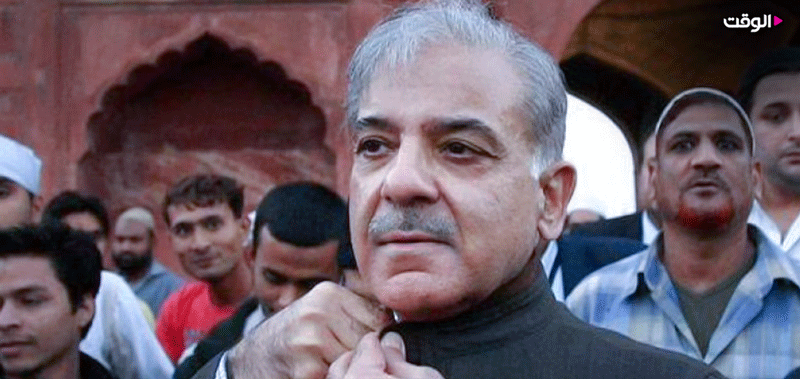Alwaght- After controversial ouster of Prime Minister Imran Khan on April 9 by the parliament, the political observers are expecting to see the aftershocks affecting the foreign, rather than internal, policy of Islamabad. By appointment of Mohammed Shahbaz Sharif, who leads the Muslim League party which holds close ties to the military, the review of the country's foreign policy more than any other thing is expected in the country.
Meanwhile, one of the actors that has had a positive view to the change in Pakistan's power structure is Saudi Arabia. Relations between Riyadh and Islamabad have seen an unprecedented level of chill since Imran Khan took office on August 18, 2018, but after the ouster of the former cricket champion, the Saudis appear to be among the happiest players about the Pakistan's developments in the past few weeks. Now the interesting point is that shortly after election, Shahbaz is planning a visit to Riyadh as the destination of his first foreign trip as PM.
According to news sources, the new Pakistani PM will leave for Saudi Arabia on Wednesday to meet with the leaders of the Arab kingdom. This trip is basically taking place against the backdrop of coldness affected their relations in the past three years. Now the question is that will they regain their warm relationship of the past now that a new PM has come to power?
Saudi Arabia fast welcomed Imran Khan removal
Over the past few years, Imran Khan has taken firm positions in a bid to draw an independent foreign policy for Islamabad. The result of this approach was his step towards adopting policies contrary to the wishes of the US and some Arab countries on various issues, the most daring of which was his visit to Moscow and meeting with President Vladimir Putin of Russia in the first day of the Russian operation in Ukraine, a pro-Western state.
Following this trip, the conspiracy of Washington and its allies began with the coordination of opposition parties and a large number of army leaders to oust Imran Khan. Finally, on April 3, in the parliamentary session over the vote of confidence, a great controversy erupted, ending with a Imran Khan dismissal a week later with a no-confidence vote.
In the middle of this hemming and hawing, Riyadh, among other foreign actors, was in favor of the anti-Imran Khan motion. Its close relations with the Pakistani military, as well as persuasion of opposition parties to oust the PM, was a behind-the-scenes role that Riyadh played in bringing Mohammad Shahbaz Sharif to power.
After the election of the new PM in Pakistan, Saudi Arabia, along with some of its other Arab allies such as the UAE, Bahrain and Egypt, welcomed Shahbaz Sharif the most. Saudi Crown Prince Mohammed bin Salman held a phone conversation with the new PM to invite him to visit Riyadh. Shahbaz responded affirmatively.
Nawaz Sharif party's traditional closeness to Saudi Arabia
Saudi Arabia and Pakistan traditionally have good relations. Pakistan's financial and economic need for Saudi petrodollars and Riyadh's need for Pakistan's military and security support have been the two main driving forces of relations between the two countries. Meanwhile, the Saudi rulers have been closest to the leaders of Nawaz Sharif's Muslim League party. The party has maintained good relations with the Saudis at various times and has always tried to ensure that the cooperation between the two sides is at the highest possible level.
Before Imran Khan and under Nawaz Sharif, the former leader of Muslim League, the two countries' relations were especially warm. Although Nawaz did not embroil the army in the Saudi-led aggression against Yemen despite Riyadh request, the Saudis knew that this decline was because of opposition of the public, lawmakers, and the army generals and that if Nawaz could make an independent decision, he would have deploy the military forces to Yemen war.
Presently, Shahbaz Sharif hopes to convince bin Salman during the first trip to Riyadh to increase financial support for Islamabad, which has been very limited over the past two years. In addition to financial aid, Pakistan's new leader also seeks political and diplomatic support from Persian Gulf Arab states. Moreover, he eyes cooperation to advance bilateral relations and pave the way for investment and job creation in his country.
Shahbaz Sharif and accumulated Islamabad-Riyadh differences
Although Shahbaz Sharif's election has injected optimism in the Saudis and the Pakistani government to patch up things, it is noteworthy that the large scale of differences in their bilateral relations and regional policy makes a solution difficult. The prediction is that at least in the near future they would not regain the past warmth of relations.
Under Imran Khan, who also had very close relations with the army and followed the army generals' views on foreign policy issues, Islamabad practically confronted Saudi Arabia in key Saudi foreign policy cases like Yemen war, Qatar blockade, and rivalry of the Muslim Brotherhood-advocate Turkey. In reciprocation, the Saudis showed no support to Islamabad agenda in the high security case of Kashmir and Indian scraping of Kashmir's autonomous status in 2019. Riyadh even facilitated Indian toehold gain in the Persian Gulf, sounding the alarm about end of Saudi-Pakistani strategic alliance.
Held back by the trade volume of $27 billion with New Delhi, the Saudi rulers declined to condemn the violence against the Muslims in Kashmir by the Indian military. But beyond the economic relations with India, the Saudis actually took revenge on Pakistan for its Yemen war involvement rejection.
How can the two countries solve these two big challenges in their relations? We must ask in the new conditions. Will Pakistan yield to the Saudi pressures for Yemen war involvement? Will Saudi Arabia resume its past financial aids to Pakistan? It takes some time to answer these questions.



























